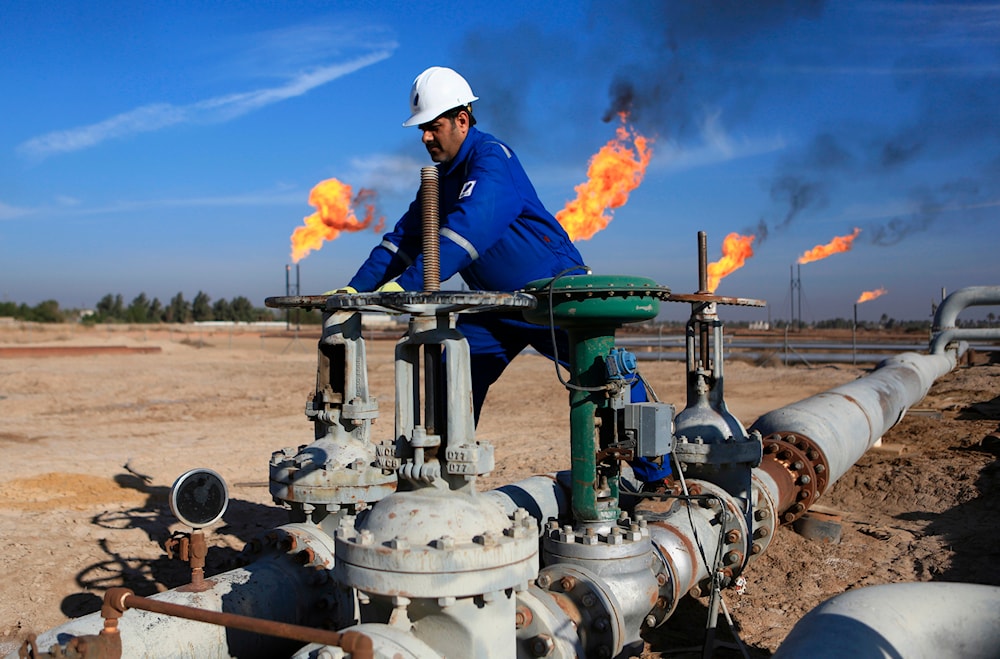Maximum pressure: US ends Iraq’s ability to pay for Iranian energy
The US revokes a crucial waiver, halting Iraq's payments for Iranian energy amid an escalating energy crisis. This move is part of Washington's broader strategy to pressure Iran into accepting a harsh nuclear deal.
-

A worker operates valves in the Nihran Bin Omar field north of Basra, Iraq, on January 12, 2017. (AP)
The United States has allowed a waiver permitting Iraq to pay for Iranian-provided electricity to lapse, a State Department spokesperson said on Saturday.
The spokesperson said that Washington will not allow Tehran any economic or financial relief, in line with the Donald Trump administration's "maximum pressure" policy.
"The President's maximum pressure campaign is designed to end Iran's nuclear threat, curtail its ballistic missile program, and stop it from supporting terrorist groups," the spokesperson stated.
Iraq searches for alternatives to Iranian power, energy supplies
Earlier, the State Department welcomed Iraq’s commitment to ending gas imports from Iran, a move that forces Baghdad to seek alternative energy sources. While Iran remains a key energy supplier to its neighbor, it has recently struggled with rising domestic demand and production challenges.
Abrupt cuts to Iraq's gas and electricity supplies have underscored the urgent need for alternative sources or increased local production. Baghdad has also worked on decreasing energy production waste to offset Iranian energy cuts.
Nevertheless, Iran has continued to supply Iraq with a substantial amount of power, which proves crucial for Iraqis during the hot summer months when energy consumption soars.
Iranian gas fuels Iraqi power plants, and when combined with the electricity supplied by Iran, this accounted for a reported 1.5 gigawatts (GW) in 2024. However, during Trump's first term, Iran's total supply reached 10 GW, constituting 40% of Iraq’s peak power production. As summer approaches, Iraq has outlined plans to locally produce 28 GW of electricity, which will only cover around 60-75% of the anticipated demand, according to the Washington Institute for Near East Policy.
Read more: Iraq plans to cut gas flaring to 20% in 2025
US policies aim to dismantle vital industries in West Asia
Although both Iraq and Iran are global leaders in energy reserves and production, both have suffered from damaging Western policies, including direct military actions. For instance, Iraq’s vital energy and power infrastructure, which is difficult to replace, was targeted and destroyed by the US during the Gulf War and the 2003 invasion.
Meanwhile, Iran has faced extensive and crippling sanctions, severely limiting its ability to revitalize its industrial infrastructure. These sanctions have restricted access to advanced foreign technology, essential equipment, and international financing, all of which are critical for modernizing key sectors such as oil, gas, and power generation. With restrictions imposed on high-quality drilling rigs, turbines, and refinery-related imports, Iran has battled to maintain and upgrade facilities.
Additionally, financial restrictions have cut off access to global investment and markets, forcing Iran to rely on costly and less effective domestic alternatives or deals with a limited number of international partners.
Read more: Dutch media uncovers culprit in Iranian nuclear program 2007 sabotage
Maximum Pressure: Sanctions, energy warfare, military threats
The US decision to revoke Iraq’s ability to pay for Iranian energy is not an isolated policy shift but a move within Washington’s broader maximum pressure campaign against Tehran. Initially launched in Trump's first term in office, this strategy aims to cripple Iran’s economy, isolate it diplomatically, and coerce it into accepting a more restrictive nuclear agreement—under the threat of severe military aggression.
Trump’s policy framework, which the Biden administration largely continued, has been heavily influenced by Israeli officials who demand US action against Iran. The US and "Israel" have worked tirelessly to neutralize what they perceive as Iran’s nuclear ambitions through diplomatic, economic, and military means. This includes targeted assassinations and wide-scale cyberattacks.
The joint US-Israeli policy operates on the assumption that if Iran does not accept a harsher nuclear deal—one that limits its international influence, missile ranges, and defence capabilities—military action remains a viable option. Israeli officials have repeatedly warned that they will not allow Iran to develop a nuclear weapon, and both Washington and Tel Aviv have escalated military drills simulating large-scale strikes.
CENTCOM Conducts Bomber Task Force Mission
— U.S. Central Command (@CENTCOM) March 6, 2025
On March 4, U.S. Central Command (CENTCOM) conducted a Bomber Task Force Mission in the Middle East, strengthening partner interoperability and demonstrating force projection capabilities in the region. It was the third BTF mission in… pic.twitter.com/AIEh8Fyqgx
Read more: US B-52 bombers fly over ME countries in clear saber rattling
Iran principled in rejecting West's diktats
Iran has recently taken a firm stance against US demands for "negotiations." The leader of the Islamic Revolution, Sayyed Ali Khamenei, has condemned these initiatives as attempts at "bullying," asserting that such talks are merely a pretext for the US to impose its expectations on Iran.
Iran has continued to advance its nuclear program in alignment with its national interests, maintaining that its nuclear activities are for peaceful purposes. The country's nuclear advancements, however, have raised concerns internationally, particularly regarding the potential for weapons-grade enrichment.
Concurrently, Iran has bolstered its defensive capabilities, testing several advanced air defense systems, strengthening its naval forces, and enhancing its missile capabilities. These moves are seen as a clear indication of Tehran’s preparedness to counter any external aggression, ensuring its sovereignty and regional influence in the face of growing pressure from the US and its allies.
Read more: Iran strengthens air defense at nuclear sites in bold war game move

 5 Min Read
5 Min Read










